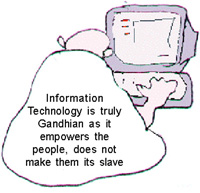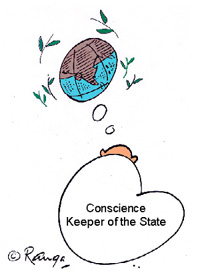SK Sharma
G
andhi was a social activist. He was also a great strategist. He realised that unless the common people rise against the oppressive imperial rule, freedom
could not be realised. He also believed in the intrinsic moral strength of
non-violence. He was convinced that violence could lead to partition of
India and leave permanent scars on its social fabric.
He advocated non-violence as
a tool of the ethically strong, not of the physically weak.
For moblising the common people
living in the villages, he organised non-violent demonstrations, in which
thousands participated expressing full support to the ideology propagated by
him.
the common people rise against the oppressive imperial rule, freedom
could not be realised. He also believed in the intrinsic moral strength of
non-violence. He was convinced that violence could lead to partition of
India and leave permanent scars on its social fabric.
He advocated non-violence as
a tool of the ethically strong, not of the physically weak.
For moblising the common people
living in the villages, he organised non-violent demonstrations, in which
thousands participated expressing full support to the ideology propagated by
him.
Gandhi used the charka as a tool for various strategic reasons. First,
it would create dignified employment in the villages, not in filthy factories as in the early stages of industralisation. Secondly, it would challenge the might of the imperial rule where it hurt most – market for its textile industry! And above all, it would provide a uniform – khadhi kurta and jacket - for the freedom struggle!Gandhi was greatly worried that after the British left, power may get centralised and the common people may continue to be subjects in an exploitative systems. He advocated true democracy symbolished in Ram Raj, the rule of the epic monarch Ram. He called it Gram Swaraj, that is village republics.
In such true
democracy, local communities control all local resources to handle all local
matters such as administration of justice, police, education, healthcare,
and forests, and devolve a fraction, one–sixth according to Hindu
scriptures, to the state for higher level functions and coordination,
 but
not to interfere in local matters. Logically too this alone is
democracy. Controlling five-sixth revenues, local governments, prosper, the
one-sixth of the state shoots up and it too becomes prosperous! The
prosperity of India attracted numerous invasions. The warriors of India
failed in their dharma, that is, duly to protect India.
but
not to interfere in local matters. Logically too this alone is
democracy. Controlling five-sixth revenues, local governments, prosper, the
one-sixth of the state shoots up and it too becomes prosperous! The
prosperity of India attracted numerous invasions. The warriors of India
failed in their dharma, that is, duly to protect India.
Unfortunately, Gandhi got sidelined. Desire of the then leadership to centralize power led to the partition of India, the traumas of Kashmir and the all round degeneration we witness today. The only method to rejuvenate India is by instituting Gandhi’s true democracy. Power having got centralised, the political system is now unwilling to revert it to the people. Rajiv Gandhi initiated local empowerment with a good intention. However the 73rd and 74th constitutional amendments as promulgated retained effective power with the state and only decentralised corruption!
Gandhi was not opposed to technology. He favoured technology that empowered the people, not that made them its slave. In his book, "The Third Wave", Alwin Toffler wrote that information technology is truly Gandhian as it empowers the people, does not make them its slave. Gandhi was totally opposed to unbridled capitalism. He advocated an egalitarian economic system in which local communities allot land to industry and monitor that it sets up enterprises to create dignified employment, produce goods and service useful to society, and generate wealth for expansion to meet the needs of the society, and for philanthropy, but not for ostentations consumption. It is truly capitalism with a human face. Gandhi called it industry in trusteeship of society.
To facilitate
such a reform process, People First has conceptualised that contemporary
democracy needs an independent Sovereign Rights Commission with authority to
direct referendums, except on issues fundamental to democracy or the
integrity of the nation.
Soviet type socialism has collapsed under its own weight. Capitalism leads to over consumption of resources and abberations such as climate change and global warming. Both are unsustainable. The only method for realising a self reliant just world order is through Gandi's egalitarian democracy. The process for realsing it is through the royal priest in its contemporary incarnation, Sovereign Rights Commission. The people need to launch movements to pressurise vested interest to establish such a commission.
q